By William Horsley, CFOM International Director
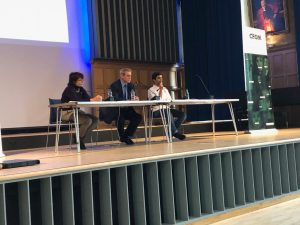
On Thursday November 7, 2018, a topical CFOM Panel debate was held on ‘The Assault on Press Freedom: Why attacks on journalists spell danger for the Rule of Law and Democracy’. It took place during the University of Sheffield’s International Journalism Week, when leading exponents of media freedom and human rights were invited to inter-act with students on urgent issues facing the world of journalism.
The event was one of more than 20 such commemorations and debates around the world marking the UN’s International Day to End Impunity for Crimes against Journalists on or around 2 November. Other cities where events were held included Beirut, Paris and New York. Since 2012 the United Nations has explicitly recognised the essential link between press freedom and the rule of law. That is why UN bodies and agencies now devote great efforts to ending impunity for violent crimes and all kinds of attacks against journalists.
The occasion began with 200 students and university staff standing to observe a minute’s silence to commemorate the over 1000 journalists whose violent deaths were recorded by UNESCO between 2006 and 2017. In nine out of ten cases the perpetrators are never brought to justice. UNESCO is the UN agency with a mandate to protect the safety of journalists and freedom of expression,
The three Panel speakers spoke from their experience about the link between journalists’ right to report safely and the rule of law in society. William Horsley, who as a BBC correspondent reported for many years from Asia and Europe, said the murders of prominent journalists around the world since the start of the 21st century were a symptom of the breakdown of law and order in countries where those deaths took place.
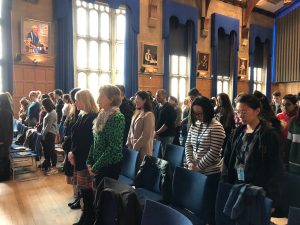
A minute of silence to commemorate journalists who have been killed while practicing their profession.
Extreme failures of justice after the murders of prominent journalists
Well-known cases include the contract killing of investigative Russian journalist Anna Politkovskaya in 2006; Turkish journalist and editor Hrant Dink in 2007, Sunday Times war correspondent Marie Colvin in Syria in 2012; and Daphne Caruana Galizia, who exposed corruption in high places in Malta, in October 2017. In every case, William Horsley said, the masterminds of those cold-blooded killings have so far not been brought to justice. Why? Because in each case powerful political forces are suspected of interfering with the judicial process that should have led to the trial and conviction of those responsible. Without independent justice and free speech there can be no rule of law and no true democracy.
Paul Caruana Galizia, the youngest of the three sons of Daphne, described growing up and living in Malta in his mother’s house during thirty years of continuous, often violent harassment at the hands of powerful forces in Malta. Those forces used every possible means to stop her from publishing the results of her investigative reporting, including articles about the revelations contained in the Panama Papers, which pointed to widespread fraud and money-laundering by senior figures in Malta.
Paul described how the family house had been the target of a serious arson attack and their dogs had several times been poisoned; politicians from both the major parties in Malta had tried to silence her by bringing over 40 defamation lawsuits with massive claims of damages; and his mother had been the subject of trumped-up police charges. Yet nobody had ever been prosecuted for those violent attacks and judicial abuses.
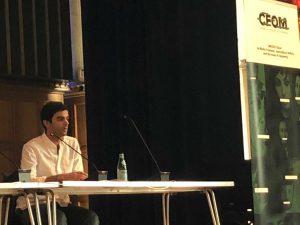
Paul Caruana Galizia says nobody in Malta was prosecuted for 30 years of intimidation against his mother Daphne.
For Paul it is encouraging that journalists from several different media around the world are collaborating in the ‘Daphne project’. They are continuing to follow up and publish reports based on the leads and evidence of corruption and abuses of power which Daphne Caruana Galizia brought to light during 25 years as the most widely-read and respected journalist in Malta.
Albana Shala, who now works for Free Press Unlimited (FPU), a leading Dutch NGO, said she was motivated when she was very young to campaign for press freedom and basic human rights. She was brought up in postwar Albania when the people lived under an extreme form of communism. Her father, she recalled, had been a journalist working for state media. Each evening, when he came home, Albana’s mother would ask him : ‘How many lies did you tell today?’ In those days, she said, the information disseminated by Albanian state media was all propaganda and lies.
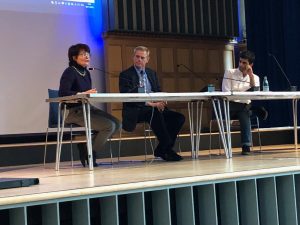
Albana Shala chairs the only inter-governmental mechanism to monitor and fight against impunity.
Now Albana occupies an important international job advancing press freedom and improving the protection given to journalists. She is the chair of a key body within UNESCO: the International Programme for the Development of Communication (IPDC). It’s an inter-governmental body which manages the world’s only official mechanism for Monitoring and Reporting on the Safety of Journalists and the Dangers of Impunity (meaning the failure to bring to justice those responsible for crimes).
A new UNESCO Report on Safety and Impunity: the world wakes up to the dangers to democracy and the rule of law
This week, on 21 and 22 November, the IPDC Council receives a new Report by the Director-General of UNESCO with the latest information about the number of journalists’ killings and the state of the judicial follow-ups by the relevant state authorities to bring the killers to justice in court.
The Report was published earlier this month. It shows that in 2016-2017 alone as many as 182 journalists, including media workers and social media producers engaged in journalism, were killed. More than half of those deaths (55 percent) occurred in countries which are officially at peace, while 45 percent occurred in war zones. The worst region of the world in terms of journalists’ killings in that two-year period was the Asia-Pacific. That reflects the alarming rise in journalists’ killings taking place in South Asia (India, Pakistan and Bangladesh) and the Philippines.
Already in 2018 UNESCO has individually recorded and condemned well over 80 more journalists’ killings which must be added to the awful total of 1010 since the year 2006.
The UNESCO D-G’s Report is closely watched by governments as well as by civil society and media organisations. There are some positive signs in the latest report. It shows that in the most recent period there has been a slight increase in the number of investigations that led to convictions in cases of journalists’ killings (11 percent of the total); but that means that a climate of impunity still protects those responsible in almost 9 out of 10 cases.
Notably, too, the states where killings have taken place have become more diligent than they were in earlier years in responding to the UNESCO DG’s requests for information. So global awareness of the importance of protecting the lives and work of journalists, and especially of ending impunity, has improved to some extent at least.
In reality many states would prefer to avoid such international scrutiny and until now the provision of information by states about investigations into journalists’ killings is still carried out on a ‘voluntary’ basis. However the pressure on state authorities to allow closer scrutiny has increased thanks to the recent global agreement on the so-called 2030 Sustainable Development Goals. SDG Sixteen, which deals with fundamental rights, access to justice and access to information for all looks proposes that all UN member states will be asked to monitor and report on the number of killings of journalists, human rights defenders and trade unionists.
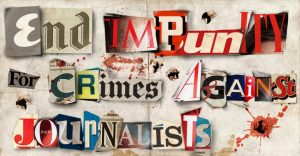
The fight to end impunity intensifies; yet impunity persists
So to understand what is really happening in the fight to end impunity for journalists’ killings it is necessary to see the whole picture. That shows us, on the one hand, that there is no sign of an end to horrific murders of journalists such as the killing of Daphne Caruana Galizia in Malta in 2017 and of Saudi journalist Jamal Khashoggi in October 2018; but at the same time unprecedented work is taking place at the UN, regional and national levels to put in place effective legal and practical safeguards against attacks on journalists and concerted efforts to eradicate the scourge of impunity.
CFOM and FPU, as well as Article 19, International Media Support and others, are listed by UNESCO among the non-governmental organisations assisting to coordinate global efforts to strengthen the safety of journalists through various activities and programmes.
The CFOM Expert Panel debate took place on 7 November at the University of Sheffield. The participants were William Horsley, international director of CFOM; Paul Caruana Galizia, Daphne’s son and a visiting fellow at the London School of Economics; and Albana Shala, chair of the IPDC Council, which has played a pioneering role for the safety of journalists and the fight against impunity.
